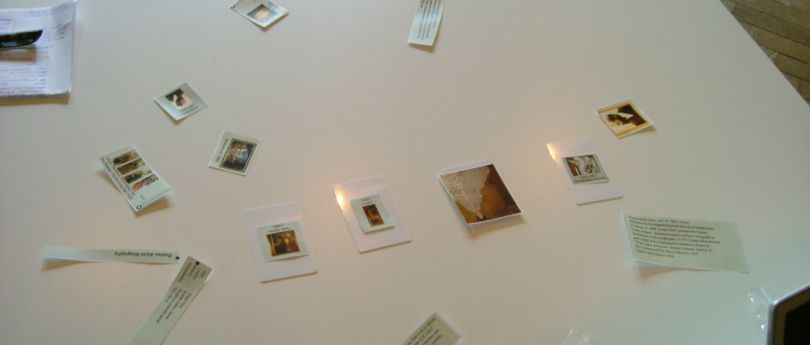Take Away Museum

Take Away Museum
— Hoe kun je het museum buiten de muren laten treden?
Dit artikel is alleen beschikbaar in het Engels.
What is the best way to get people talking about a museum collection, not only when they’re at the museum but also when they’ve gone home — over dinner, in bed, on the street, in a café, on the phone… Until now the best way to share your impressions of a museum visit is the humble museum postcard, with or without a few words scribbled on the back. The card contains personal memories and associations of a particular moment - the ideal starting point for a conversation.
From place to conversation
On 18 May Virtueel Platform will host a workshop dealing with the social
role of heritage organisations. Museums, archives and libraries are
above all meeting places, places where conversations can get going,
either in real life or virtually. The workshop examines three different
domains within such a conversation: the physical world of the objects,
the domain of digital information and the mental space of two or more
people in conversation. What role can the museum play in linking up
these three worlds?
The new role of heritage organisations
Cultural organisations are taking on board eCulture as well as examining
their changing role in society. As well as digitising and making their
collections accessible, these organisations are reappraising their role
in relation to their audience. Cultural organisations are increasingly
intermediaries in the process of ‘providing meaning’. Their knowledge
and content is no longer a clearly defined end product for visitors to
consume, but rather a half-finished product that acquires meaning only
through interaction with the audience and with other forms of cultural
expression. Two essential ingredients in this process are cooperation
between cultural organisations and a greater role for the audience.
The workshop
This one-day workshop brings together small teams of participants who
design scenarios for the issues raised above. The ingredients are the
following themes: linking physical objects and digital information (RFID
and unique identification codes); social networks and social
interaction; and tagging as an alternative to traditional classification
systems.
The participants
We aim to come up with a productive mix of designers, developers and
project leaders of cultural organizations, who together can develop
scenarios for a framework that will raise many issues around heritage
collections.
Location: KHL, Oostelijke Handelskade 44, Amterdam
Costs: 75 Euro
Subscribe: Unfortunately the workshop is already fully
booked, you can still subscribe for the waitinglist by sending an e-mail
to info@virtueelplatform.nl with your name, position and organisation.
The speakers and facilitators
Ulla-Maaria Mutanen
Ulla-Maaria Mutanen recently set up the Thinglinks project. A Thinglink
is a free and unique code that anyone can request and use. The project
came out of the conviction that free use of unique identification codes
make it much easier to find certain ‘things’ online. Ulla gained
experience in the craft field and is currently building a Thinglink
database which links structured data and free text plus other media
using 'folksonomic tagging'.
ullamaaria.typepad.com/
www.thinglink.org
Ulla-Maaria Mutanen is currently working on her PhD at the Center for
Activity Theory and Developmental Work Research at the University of
Helsinki. She is also developing a project looking at the link between
technology, fashion and craft. She is a board member of the Finnish
Association of Designers.
ullamaaria.typepad.com/about.html
Willem Velthoven
Willem Velthoven (director Mediamatic) has built up a body of experience
with creating frameworks and platforms for telling stories, with
projects such as AnyStory (database) and Het Geheugen van Oost. As well
as building a flexible database, a key part of these projects is ways of
collecting stories, and how this should be organised. Mediamatic is
currently working on the ‘Symbolic Table’, together with Imagine IC. The
table acts as a button-free interface. Stories, photos, film and music
can be selected and manipulated simply by placing objects on the table
and then removing them. The ‘Symbolic Table’ will be used in the
workshop as a tool to come up with scenarios.
www.mediamatic.net/person-874-nl.html
Dick Rijken
Dick Rijken has a great deal of experience in running and advising on
new media projects in the cultural sector. Some of his projects include
setting up VPRO's 3voor12 lokaal, and more recently the
‘Wonderkamers’ in the Gemeente Museum in The Hague. Dick teaches at the
Haagse Hogeschool, where he set up a course for students who come up
with new media projects for cultural and social NGOs. The key issue in
this course is to coach a process in which an idea becomes a concept,
and finally a good project proposal that can raise funds. Dick Rijken
will act as facilitator in this workshop.
